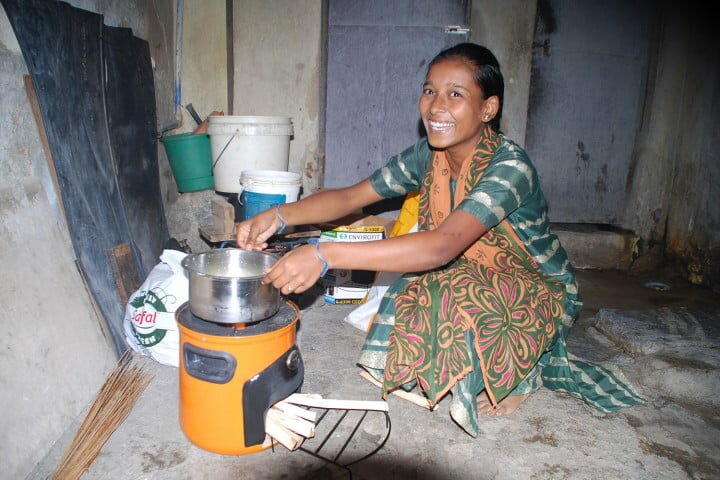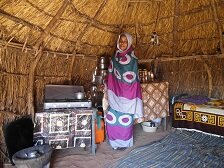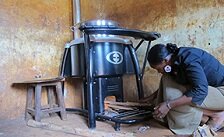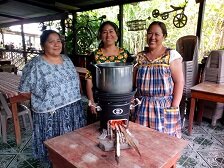OPEC Fund's partnerships and clean cook stoves

OPEC Fund's global advocacy efforts for energy poverty alleviation have enabled the organization to generate solutions and scale them up quickly and efficiently; especially when working closely with a wide network of partners to deliver the best-suited solutions. Examples of such partnerships include:
- More than 1.1 million people will benefit from a US$2.3 million project with the Shell Foundation to improve access to efficient cookstoves. One part of this project will improve access to heavy-duty cookstoves for public institutions in Cameroon, Congo DR, Cote d'Ivoire, Ghana, Kenya and Liberia. This grant will also help establish a regional hub for the manufacturing and distribution of cookstoves for seven Latin American countries; namely Belize, Costa Rica, El Salvador, Guatemala, Honduras, Nicaragua and Peru
- A US$1 million operation with Practical Action, an international non-governmental organisation, of approximately 16,000 LPG sets for poor households in El-Fasher, North Darfur in Sudan. About 112,000 people are expected to benefit from this project, which will reduce household cooking fuel costs by approximately US$15 per month, as well as decrease air pollution in kitchens and households.
- More than 24,000 affordable, effective and socially acceptable improved cookstoves were installed in the poorest households in seven western districts of Nepal through a US$2.9 million project with the SNV Netherlands Development Organization. Nearly 127,000 people were directly impacted by the new stoves, which reduce the incidence of indoor air pollution. More than 4,000 people also benefitted from community awareness campaigns focusing on the health and environmental advantages of the new cookstoves. By strengthening a vibrant, private, local cookstove sector, this program provided access to safe cooking technologies.
- A joint project led by the Global LPG Partnership and supported by the Global Alliance for Clean Cookstoves assessed the opportunities for LPG to be scaled-up as a clean cooking fuel in Kenya. The study appraised both the demand and the market structure for LPG. The research estimated the total market potential for LPG usage for household cooking, developed a rich fact base around the opportunities and challenges related to accelerating the use of LPG for cooking, and provided an early evaluation of the potential for investments or other interventions across the LPG value chain to increase access to LPG cooking fuels and stoves.
- A study by the Clean Cooking Alliance (formerly the Global Alliance for Clean Cookstoves) assessed how reductions in unpaid care work due to the adoption of clean cooking technologies can increase gender equality, and explored how time savings/shifts impact household social and economic well-being.
- A project with Entrepreneurs du Monde enhanced access to modern, clean and affordable energy for rural populations in Burkina Faso, the Philippines and Togo with a view to improving their living conditions and preserving the natural environment, while bolstering the local economy. Specific objectives include expanding the range of energy access solutions available in these countries and improving performance levels and quality of services, with a focus on LPG cooking solutions and PAYGO solar-home-systems.
- Nearly 1,000 people in Cameroon benefitted from a project with the Global LPG Partnership that helped expand work with key microfinance institutions in the country for the LPG sector for lower income households. A second component of this project helped develop a clean cooking strategy for the 15 countries part of the Economic Community of West African States (ECOWAS).
- A project in Kenya and Tanzania with SNV Netherlands Development Organisation improved sanitation in schools and water resources in the area while at the same time produced biogas for cooking at the schools and agricultural fertilizer for sale. This second component developed and implemented an affordable and standardized mass-produced biogas system that could be adopted first in other schools, and later in private and public organizations. Nineteen such systems - including three pilots - were installed in schools in the two countries benefit 9,500 schoolchildren and staff every year. Bio-slurry, solid waste by-product, can be sold as fertilizer to generate an income stream for the schools and increase farmer's crop yields.
- Hundreds of retailers in Burkina Faso and Haiti were trained and are actively selling energy efficient products thanks to an Entrepreneurs du Monde program that expanded the manufacturing of items such as improved stoves and solar lanterns to make them available to the poorest households in rural and peri-urban areas in the two countries.
- A project by the Group for the Environment, Renewable Energy and Solidarity (GERES) enhanced the production of efficient cookstoves in Mali. This was achieved through transferring the required technical know-how, providing training to existing and expanding local staff at the existing workshops, and extending the distribution network. The project also focused on supporting institutional initiatives in scaling-up and improving the local production of ceramic cookstove liners, as well as increasing the charcoal briquette production and supply chains.
- More than 200,000 people benefitted from a Shell Foundation initiative that improved access to efficient cooking stoves in Sub-Saharan Africa and Latin America. A second component of the project set up a regional hub for seven Latin American countries for the manufacturing and distribution of a type of cookstoves that OPEC Fund supported in an earlier project.
- The Shell Foundation expanded the availability of safe, clean and affordable energy services, including lighting and clean cooking stoves to rural populations in Kenya, Tanzania, Ethiopia, Uganda, Malawi, Zambia and Honduras.


